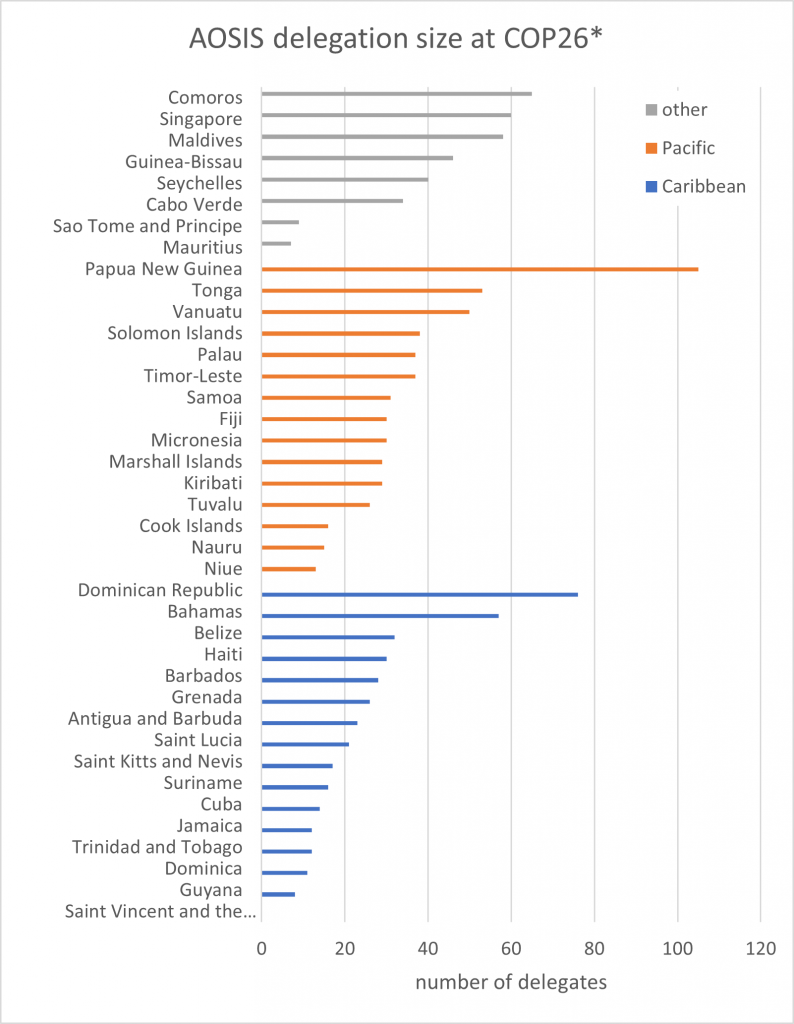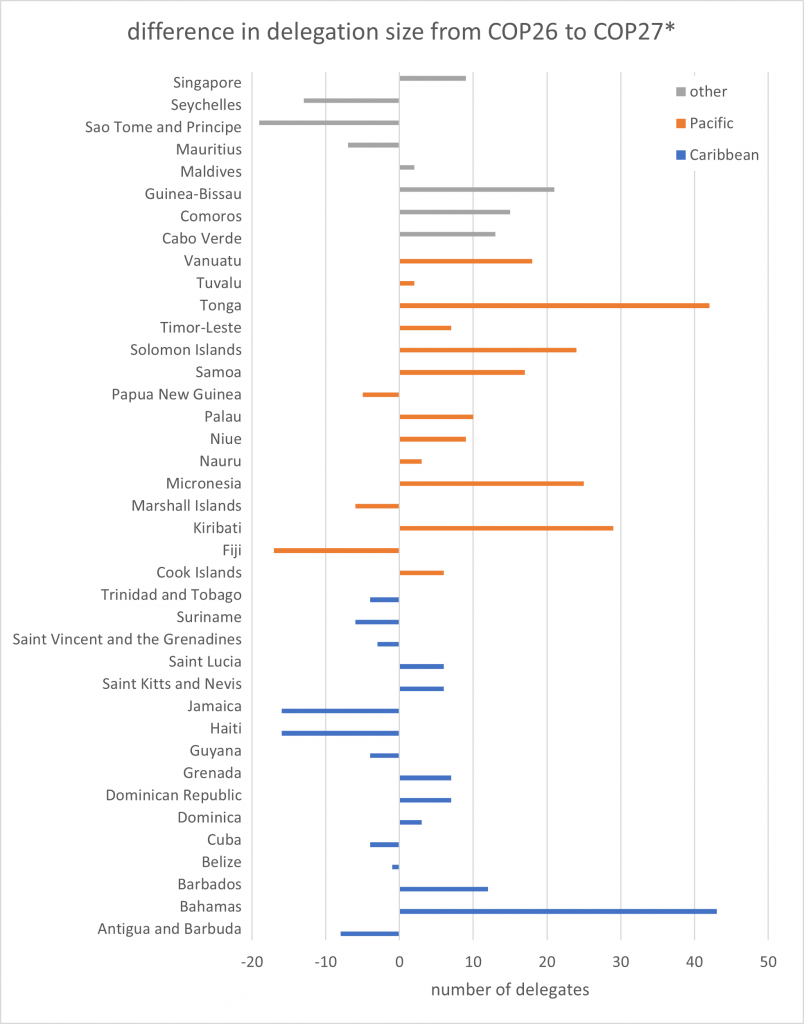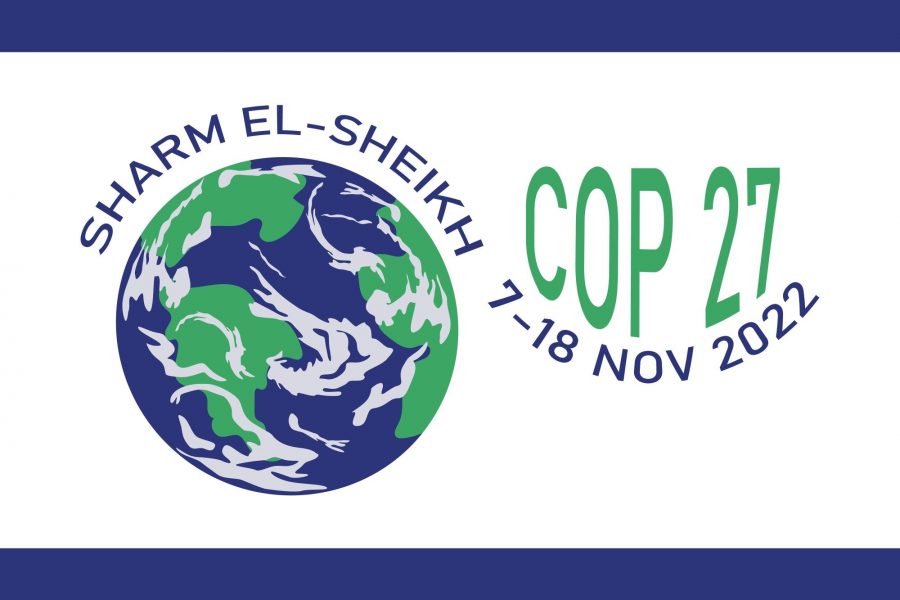
Research & Innovation
18 November 2022
Workshop: Policy Instruments for the energyefficiency sector: enabling mechanisms for the EU‘s“FIT for 55”
23 November 2022By Carola Klöck
Small island states – or rather, Big Ocean States (BOS) – are among those most affected by the impacts of climate change. Ever more frequent and intense storms, droughts, ocean acidification and coral bleaching, or sea level rise threaten the lives and livelihoods of islanders across the globe. Ambitious climate policies and steep reductions of greenhouse gas emissions are therefore essential for BOS, who themselves have contributed almost nothing to man-made climate change. Together, the 40 to 50 BOS (depending on which islands you count) are responsible for only 1% of global greenhouse gas emissions. BOS hence depend on other, larger polluters to cut their emissions – and the global climate summits under the UN Framework Convention on Climate Change (UNFCCC) are a key platform for meeting those larger polluters and pressuring them to accept more ambitious mitigation commitments.
BOS recognised the need to be vocal and visible at the climate summits early on, and formed an alliance, the Alliance of Small Island States (AOSIS) in the early 1990s, when climate talks just came into being. AOSIS has since grown to 39 member states, and has become one of the major groups in climate negotiations – no small feat for this groups, whose members are mostly small or very small: Tuvalu for example has only 11,000 inhabitants, St. Kitts and Nevis has about 50,000 inhabitants, São Tomé and Príncipe has 200,000 inhabitants.
Participating in the UNFCCC Conferences of the Parties (COPs), which are extremely large, technical and complex, is not easy. Having larger delegations help to navigate the COPs: Having more delegates means more, and more diverse expertise. You can cover more agenda items (which range from emissions from transport to forest issues to gender questions, to name but a few), and attend more meetings, especially when those take place in parallel. You can also participate in side events, speak with the media, or bring in new and well-rested negotiators when negotiations extend late into the night (or possibly go through the night).
But for a small country, sending more delegates is not easy, given small bureaucracies and diplomatic corps, as well as limited resources. It is not therefore not surprising to note that
BOS delegations are on average smaller than the delegations of larger countries: Between 2015 and 2019, each AOSIS member sent on average 19 delegates, compared to 55 delegates for non-island states. Delegations could be as small as just two, three, or four delegates. (Numbers based on the UNFCCC list of participants). In Glasgow last year, several islands had still closed borders, and as a result, could only send diplomats that were based abroad, such as members of their Embassies in New York or Geneva, but no one from capital.[1]
BOS seemed to have wanted to make up for that gap, and sent record numbers of delegates to this year’s COP. Overall, AOSIS sent 1241 delegates, up from 1034 at COP26, and from an average of 746 in the period 2015–2019. The average AOSIS delegation comprised 32 delegates, or 13 more delegates than in the period 2015–2019. This compares to an average delegation size at COP27 of 94 for non-AOSIS members. (This number decreases to an average delegation size of 87 when excluding the United Arab Emirates, the host of next year’s COP, which sent over 1,000 delegates).[2] Despite this overall increase, several islands had relatively small delegations: Among the ten smallest delegations, three were from islands (Mauritius, 7 delegates; Guyana, 8; and Sao Tomé e Príncipe, 9). Three countries had no delegation at all, among which one island: Saint Vincent and the Grenadines.[3] Others had large delegations, such as Papua New Guinea (105 delegates), Dominican Republic (76 delegates) and Comoros (65 delegates). Many delegations were also high-level, and included several ministers, heads of state and government. For example, the Tonga King and Queen were present, as were the Tongan Prime Minister, the Minister for Agriculture, Food and Forest, as well as the Minister for Finance. Note that some high-level delegates were only present for the leaders’ summit at the start of the negotiations, but did not stay for the technical and last-minute political negotiations.


Participation in COPs is expensive, not only in places like Sharm El-Sheikh, where hotel costs had soared. But costs go well beyond funding travel and accommodation. Delegates invest a lot of time in COP participation: Two weeks of negotiations, plus one week of pre-COP to coordinate within AOSIS and other groups, plus often up to one week of travel time: Several delegates explained to me that they spent two to three days (including long layovers) to arrive at Sharm El-Sheikh, and the same to return home. Particularly in smaller states, delegates have multiple responsibilities, and being away for four weeks means neglecting those other responsibilities. Such investments show how critical climate change, and ambitious climate policies, are to BOS. They invest heavily in their international advocacy, especially at COPs – and it seems that their presence does make a difference: With the descision to establish a dedicated funding arrangement for loss and damage, a key AOSIS demand was met at COP27. Yet overall, the outcome is rather disappointing, falling short on mitigation – which is most critical, since no funding can make up for the losses and climate catastrophes in small islands (and beyond) that result from too little, and too slow, mitigation.
[1] See last year’s blog contribution: https://www.sciencespo.fr/psia/chair-sustainable-development/2021/12/07/aosis-in-glasgow-cop-participation-in-a-pandemic/
[2] All data from Carbon Brief: https://www.carbonbrief.org/analysis-which-countries-have-sent-the-most-delegates-to-cop27/
[3] The other two absent countries were Afghanistan and Myanmar; both had also sent no one to Glasgow.


